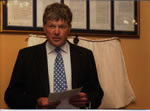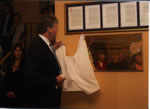Thomas Nelson III Made a Difference - A Day in 1908: Episode 2
Lorne [Thomas] Nelson V, the grandson of Thomas Nelson III - top hero at The Prestoungrange Gothenburg, gave us all the authoritative verdict on June 19th: that his grandfather was not an abstainer. His loan of £2000 in 1908, with 5% pa interest expected until its repayment in 1915, had enabled the Gothenburg to be built in Prestonpans. He was simply convinced, along with others in the original [1901-1917] East of Scotland Public House Trust, that a good quality, sociable pub with extensive food arrangements and no incentivisation for the manager to sell as much alcohol as possible, was a sensible facility to build hereabouts. And may he long be remembered for that.
Led by Master of the Courts' Musick Lindsay Davidson on the pipes all Panners and visitors made their way to the Thomas Nelson Suite at 11 am prompt. Thomas Nelson V there unveiled the commemorative plaque that reminds us of the role Thomas Nelson III played in establishing the Gothenburg in Prestonpans, and has above it is a copy of the original £2000 Loan Note. The plaque also reminds us that he died during the Great War at Arras in April 1917, and formally declares that the Functions and Events facilities at The Prestoungrange Gothenburg shall henceforth always be known as the Thomas Nelson Suite.
Click on pictures to enlarge
  
So it was then; and so it is again today, with the surplus above the traditional Gothenburg 5% pa roce going to the Scottish Charity known as The Barons Courts which sponsors the Prestoungrange Arts Festival.
The Man who Made the Loan that gave us The Gothenburg
Lorne [Thomas] Nelson V movingly told us of his grandfather in the following words.
‘Tommy Nelson III was Chef de Famille Nelson whose own grandfather had opened a second hand bookstall at 7 West Bow in Edinburgh in 1778. From there it progressed to reprints of the classics and by 1861 had 600 employees. Forster’s Education Act of 1870 meant a massive growth in demand for school texts which Nelsons went on to meet with outstanding success, using the rotary press they had invented and exhibited at the Great Exhibition of 1851, at their Hope Park works. On April 20th 1878 that entire works burnt to the ground at a total loss then of £200,000. Undaunted, new machinery was ordered and using temporary wooden sheds they were back in business in two months with a list of 150 of their best selling titles. They built new works in Parkside with the most modern machinery of the day and opened offices in London, New York, Paris, Melbourne and Toronto. One of their most astonishing achievements was the cloth bound 1905 Nelson Sixpenny Classics Series [just 2.5p today]. Parkside expanded to print 200,000 hardbound books each week.
That was the business that Thomas Nelson III entered when he graduated from Oxford after having captained that university at rugby and been capped for Scotland too. [Surely he would be pleased to know of the contemporary role of Scotland’s current rugby captain Scott Murray at The Gothenburg which he ensured was established nearly 100 years ago.]
John Buchan, who was later to become Lord Tweedsmuir and Governor General of Canada, knew him at Oxford and later described him as “in some ways the most conspicuous figure our academic generation.” Buchan became a director of Thomas Nelson the Publishers and observed: “ On the eve of the Great War we must have been one of the largest businesses of the kind in the entire world, issuing cheap editions of every kind of literature not only in English but in French, German, Magyar and Spanish and being about to start in Russian.”
Then came the greatest imaginable tragedy. Thomas Nelson III serving as a Captain in the Lothian and Border Horse [now depicted in a new portrait by local artist Thomas Ewing that hangs in the Thomas Nelson Suite] was killed aged 40. That ended the great era of the firm. John Buchan wrote at the time: ”His death left an aching sense of bereavement in a great multitude not only of friends but of slight and casual acquaintances. He had his roots so deep and far spread that his loss made a bigger hole in the life of Scotland than would have been the case perhaps with any other man of his years.”
Published Date: June 19th 2004
|





